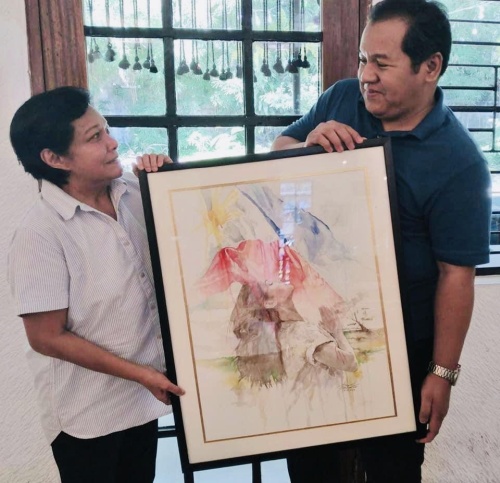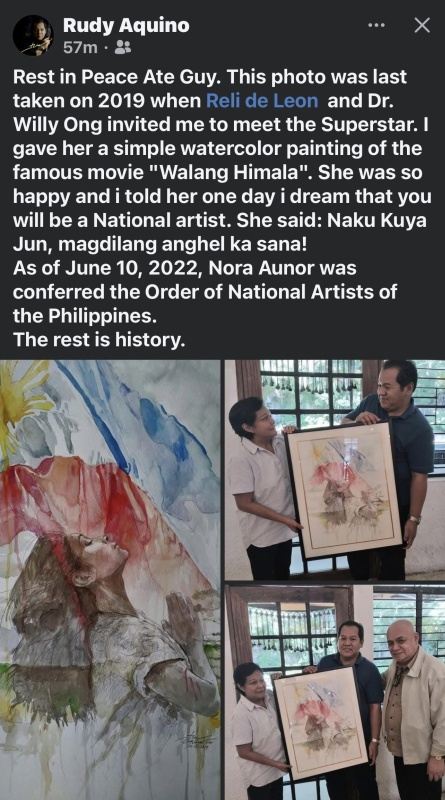
|
Philippines, 01 Mar 2026 |
Home >> News |
 |
||||
|
|
|
|
There Are No Miracles— Just Nora Aunor By Emmanuel Rivera, RRT PhilBoxing.com Fri, 18 Apr 2025  Himala - A painting by Rodolfo "Jun" Aquino. There are no miracles, she said. But there she stood—defying gravity, time, the odds, and the expectations of an industry that once tried to cast her aside. No miracles? Then how do we explain Nora Aunor? She came from Iriga, with nothing but a voice and a name borrowed from hardship. No studio backing her. No rich relatives pushing her to the front. Just a train station, a jug of water, and a voice that could still the noise of the tracks. When she sang, people listened. When she acted, people believed. And when she wept on screen, a nation cried with her. Nora Aunor did not belong to any one generation. She belonged to every era that needed her. In a country of fractured dreams and fading hopes, she gave us dignity. Not because she played the beautiful roles, but because she made every role beautiful. From the maid who bore the burden, to the saint who cracked under faith, to the mother who lost it all—she gave them voice. And in so doing, she gave voice to all of us. We called her Ate Guy, but she was more than a sister. She was memory. She was mirror. She was myth. Not the kind that floats above us, but the kind that walks beside us. In Himala, she did not act. She warned. She pleaded. She testified. Standing before a crowd of broken souls, her voice trembling, her body defiant, she declared: “Walang himala! Ang himala ay nasa puso ng tao, nasa puso nating lahat!” It was not a line. It was a line drawn in history.  Nora Aunor and Jun Aquino But thanks to the hand of one man— Rodolfo “Jun” Aquino— her truth has been preserved. Not just as likeness, but as presence. In his painting, Himala, she is still with us. Strong. Still. Sacred. “Ate Guy was our inspiration,” Aquino said. “Thank you for the memories and for showing us and the world how great Filipinos can be… Rest in peace.” It is no small thing to capture a miracle before it disappears. That’s what Jun Aquino did. He painted not the actress, not the star, but the soul we dared not forget. And he did so in time. Now, as we look back, we see how much we owed her. For the songs that healed. For the roles that revealed. For the courage to be small in a world that demanded spectacle. She never needed to shout. Her silence said enough. Her stillness could break you. We watched her rise without ever leaving the ground. And when awards finally came—National Artist, the honors, the retrospectives—she accepted them with the grace of someone who had long since stopped needing applause. She didn’t perform for the stage. She performed for the streets. For the mothers who had lost. For the girls who had been overlooked. For the millions who never saw themselves until they saw her. Her passing is not the end of a career. It is the closing of a chapter in our cultural scripture. A scripture that told us: yes, you matter. Even if you’re poor. Even if you’re brown. Even if you’re quiet. Yes, you matter. Nora Aunor proved that. So no, there are no miracles. Only women who refuse to disappear. Only voices that won’t fade. Only stories that will be told again and again, even when the stage goes dark.  Click here to view a list of other articles written by Emmanuel Rivera, RRT. |
|
|
PhilBoxing.com has been created to support every aspiring Filipino boxer and the Philippine boxing scene in general. Please send comments to feedback@philboxing.com |
PRIVATE POLICY | LEGAL DISCLAIMER
developed and maintained by dong secuya © 2026 philboxing.com. |